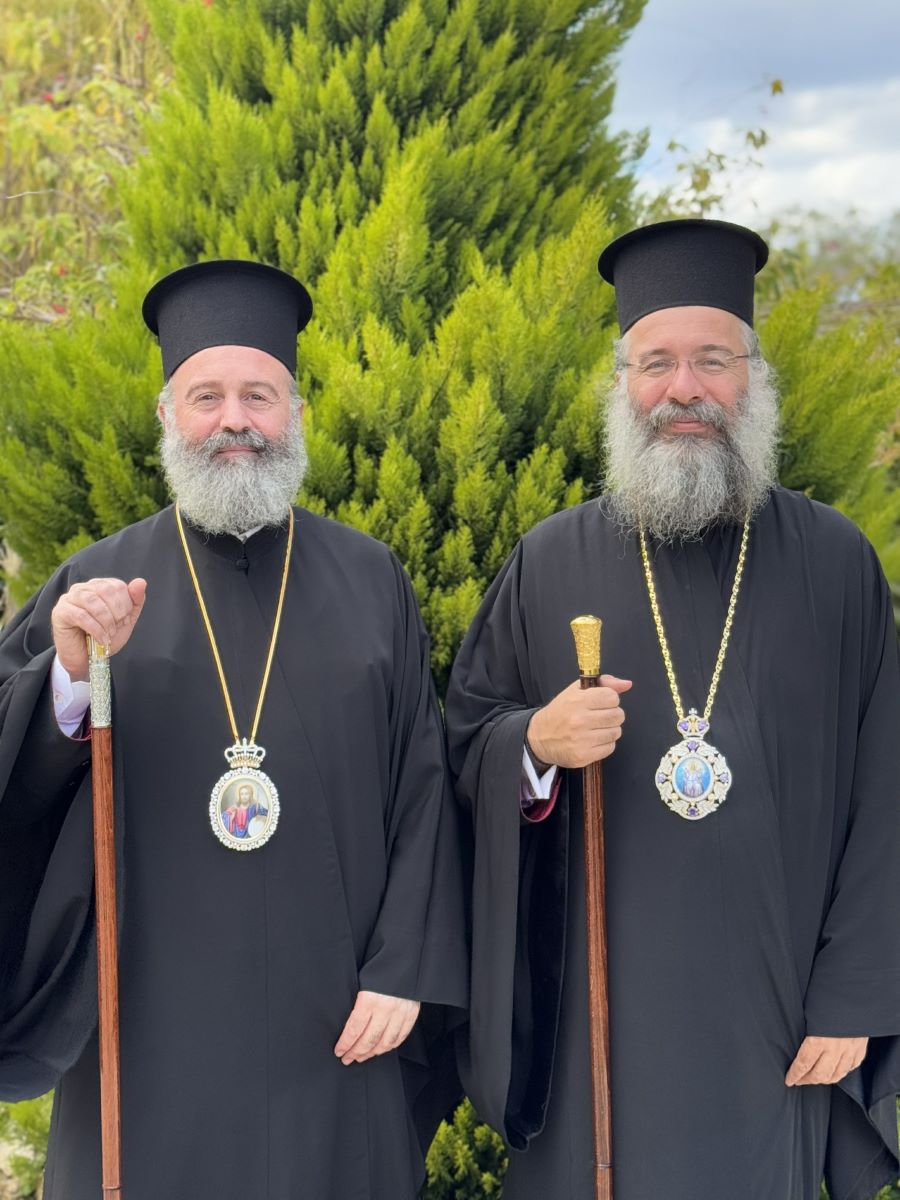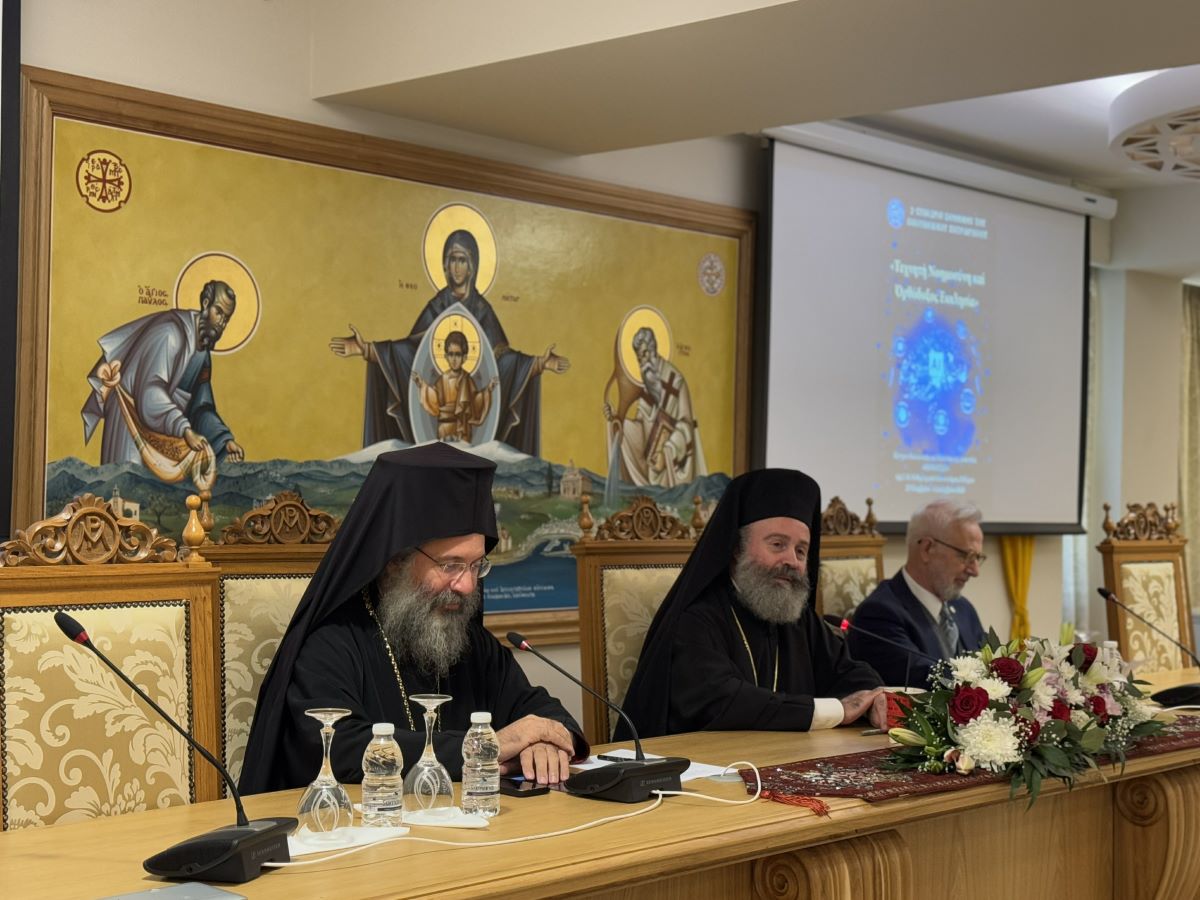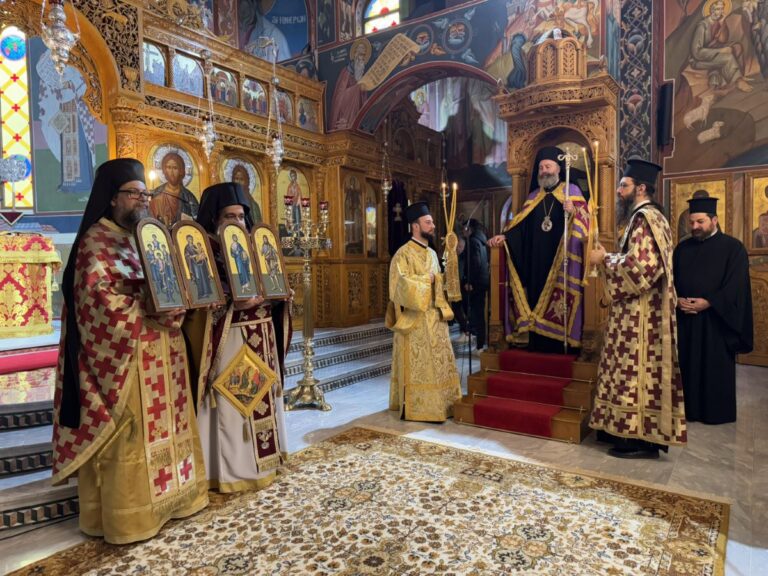The 2nd Bioethics Conference of the Ecumenical Patriarchate on “Artificial Intelligence and the Orthodox Church” commenced on Friday, 29 November 2024, at the Conference Centre of the Holy Metropolis of Rethymno and Avlopotamos “THEOMITOR”. The event was graced by the presence of notable figures such as the Representative of the Ecumenical Patriarch Bartholomew, Archbishop Makarios of Australia, Archbishop Evgenios of Crete, Metropolitan Prodromos of Rethymno and Avlopotamos, Metropolitan Nicholas of Mesogaia and Lavreotika, Metropolitan Kyrillos of Hierapytna and Siteia, local Archons, the Rector of the University of Crete, academics, and a large audience.
The Blessing Service was conducted by Archbishop Evgenios of Crete, and the opening session was led by Professor Mr. Emmanuel Karageorgoudis, the Dean of the School of Theology of the University of Athens. Archbishop Makarios of Australia, as Chairman of the Organising Committee, read the Sacred Message of Ecumenical Patriarch Bartholomew, followed by delivering a greeting and outlining the theme of the Conference from the Orthodox Theology perspective. This was followed by greetings from various dignitaries and officials.
The first day of the Conference concluded with Archbishop Makarios of Australia’s introductory speech through a video presentation, highlighting the concerns and guidelines regarding Artificial Intelligence applications from an Orthodox Church standpoint.

On Saturday, 30 November 2024, the Conference continued with various sessions and presentations from distinguished speakers on the topic. The day began with a Divine Liturgy at the Church of the Four Holy Martyrs of Rethymno, followed by sessions on “Artificial Intelligence and Orthodox Theology”, “Artificial Intelligence: Sociological and Philosophical Approaches”, and “Artificial Intelligence: A Broader Challenge”, each chaired by different moderators.
The speakers elaborated on the topic of Artificial Intelligence with references to Orthodox Theology, Philosophy, Sociology, Ethics, and Law, providing insightful discussions on the subject.
The Conference concluded with the proposal for the organization of the 3rd Bioethics Conference in Rethymno in 2025, following the approval of His All-Holiness Ecumenical Patriarch Bartholomew.

On Sunday, 1 December 2024, a Poly-Hierarchical Divine Liturgy was celebrated at the Church of the Four Martyrs of Rethymno, followed by the closing session at the Conference Centre where the Conclusions of the Conference were presented by Metropolitan Prodromos of Rethymno and Avlopotamos and warmly received by the participants.
In closing, Archbishop Makarios of Australia expressed gratitude to all involved in the Conference and conveyed the well wishes of His All-Holiness Ecumenical Patriarch Bartholomew to the attendees.
On behalf of the conference, Metropolitan Prodromos extended warm thanks to His Eminence Archbishop Makarios of Australia for his decisive contribution to the excellent organization and successful conduct of the 2nd Bioethics Conference of the Ecumenical Patriarchate. He also expressed gratitude for Archbishop Makarios’ general contribution to the Orthodox Church. Following the conference, everyone enjoyed a formal meal at the Bishop’s residence, which was graciously served by Metropolitan Prodromos.
Conference Conclusions:
The organization of this Conference reflects the ongoing interest of the Holy Great Church of Christ in scientific and technological advancements and their impact on the Christian community. It also signifies the Mother Church’s eagerness to engage in the dialogue between Science and Theology. The conclusions drawn from the presentations and discussions at the conference are as follows:
– Artificial Intelligence is a significant modern technological achievement with far-reaching applications in various aspects of human life. It is expected to drive scientific progress and shape the future of human civilization.
– While the Church recognizes scientific research as a gift from God, it also warns against the potential dangers associated with certain scientific advancements. The Orthodox Church cautions against the misuse of Artificial Intelligence, emphasizing the importance of upholding human dignity and freedom.
– The Orthodox understanding of the “nous” or intellect does not have a direct correlation with Artificial Intelligence. The Church stresses the importance of the nous transcending mere logical processing and computational intelligence, emphasizing its spiritual significance in relation to God.
– In light of the connection between Artificial Intelligence, transhumanism, and digital super-religion, the Church emphasizes the eschatological perspective of man, focusing on theosis through participation in the sacraments of the Church.

– The operation of Artificial Intelligence in critical areas of human life should be supportive and consider spiritual, social, historical, and cultural factors. The Church underscores the importance of maintaining established values and ideals in the face of technological advancements.
– As Artificial Intelligence evolves, the issue of self-programming arises. The Church advocates for a spiritual approach rooted in Gospel teachings and traditions to address ethical concerns and uphold stable values.
– Despite its practical benefits, Artificial Intelligence cannot address fundamental existential and social issues. The Orthodox Church provides theological criteria to navigate contemporary challenges and draw inspiration from its spiritual heritage.
– Living faith in Christ sustains human efforts to confront life’s complexities. The Church emphasizes the need for a transcendental reference beyond science and technology, drawing from the rich theological tradition of Orthodoxy.
Source: vema.com.au
Could you please rephrase that?
Source link

